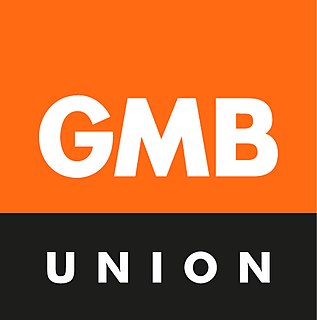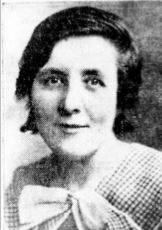Related Research Articles
In British politics, an affiliated trade union is one that is linked to the Labour Party. The party was created by the trade unions and socialist societies in 1900 as the Labour Representation Committee and the unions have retained close institutional links with it.

The GMB is a general trade union in the United Kingdom which has more than 460,000 members. Its members work in nearly all industrial sectors, in retail, security, schools, distribution, the utilities, social care, the National Health Service (NHS), ambulance service and local government.

Sidney Hillman was an American labor leader. He was the head of the Amalgamated Clothing Workers of America and was a key figure in the founding of the Congress of Industrial Organizations and in marshaling labor's support for Franklin Delano Roosevelt and the Democratic Party.
Amalgamated Clothing Workers of America (ACWA) was a United States labor union known for its support for "social unionism" and progressive political causes. Led by Sidney Hillman for its first thirty years, it helped found the Congress of Industrial Organizations. It merged with the Textile Workers Union of America (TWUA) in 1976 to form the Amalgamated Clothing and Textile Workers Union (ACTWU), which merged with the International Ladies' Garment Workers' Union in 1995 to create the Union of Needletrades, Industrial and Textile Employees (UNITE). UNITE merged in 2004 with the Hotel Employees and Restaurant Employees Union (HERE) in 2004 to create a new union known as UNITE HERE. After a bitter internal dispute in 2009, the majority of the UNITE side of the union, along with some of the disgruntled HERE locals left UNITE HERE, and formed a new union named Workers United, led by former UNITE president Bruce Raynor.

The Modern Records Centre (MRC) is the specialist archive service of the University of Warwick in Coventry, England, located adjacent to the Central Campus Library. It was established in October 1973 and holds the world's largest archive collection on British industrial relations, as well as archives relating to many other aspects of British social, political and economic history.

Dame Anne Loughlin, DBE was a British labour activist and organiser.

The Amalgamated Society of Boilermakers, Shipwrights, Blacksmiths and Structural Workers (ASB) was a trade union in the United Kingdom. Many of its members worked in shipbuilding, in which industry it was the leading trade union, while over time it also developed strength in engineering and construction.

The National Union of Tailors and Garment Workers (NUTGW) was a trade union in the United Kingdom.

The Irish Trades Union Congress (ITUC) was a union federation covering the island of Ireland.
Andrew Conley was a British trade unionist.

The United Garment Workers' Trade Union (UGWTU) was a trade union in the United Kingdom.
The General Council of the Trades Union Congress is an elected body which is responsible for carrying out the policies agreed at the annual British Trade Union Congresses (TUC).
The Journeymen Tailors Union (JTU) was a trade union in the United States, with some local branches in Canada.
Sarah Wesker was a trade unionist active in the garment industry in the East End of London in the 1920s and 1930s.
The Scottish Operative Tailors' and Tailoresses' Association was a trade union representing clothing workers in Scotland.
The Amalgamated Union of Clothiers' Operatives (AUCO) was a trade union representing clothing factory workers in the United Kingdom.
Moses Sclare was a Ukrainian trade union leader, active in the United Kingdom.
Jacob Lewis Fine was a Russian trade union leader, active in the United Kingdom.

Bernard Sullivan was a British trade unionist and politician, who served on London County Council.
The Garment Workers' Union of South Africa (GWU) was a trade union representing workers in the clothing industry in South Africa.